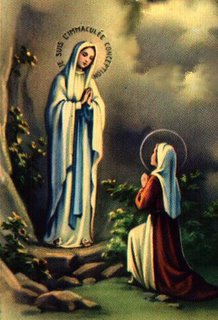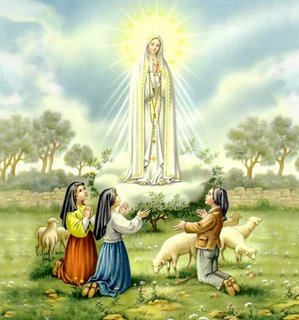
The Feast of Our Lady of the Rosary, which is celebrated each year, commemorates the great navy victory of the Christians over the Turks in 1571. At that battle, the
Battle of Lepanto
, sixty-five thousand men prayed the Rosary for three hours and took part in the Sacraments and Traditional Devotions. And, the Christian army prevailed that day against the Turks, although they were outnumbered by a 3:1 ratio. Following the colossal victory of the Christians, the Turks never fully recovered and never again threatened the Mediterranean Sea.
Pope Pius V established the Feast of Our Lady of Victory on that day - October 7th. It was later renamed the Feast of Our Lady of the Rosary. There are many other Rosary miracles including one attributed to Hiroshima and Russians pull-out of Austria.
Pray the Rosary, my fellow brothers and sisters in Christ Jesus! As
St. Louis Marie Grignion de Montfort
wrote: "The Rosary is the most powerful weapon to touch the Heart of Jesus, Our Redeemer, who loves His Mother."
The Rosary is attributed to St. Dominic in the 1200's. St. Dominic was an Augustian priest and worked for clerical reform. By age 26, St. Dominic was fighting the Albigensian Heresy, which taught that there are two Gods, marriage is a sin, and denied the Trinity, incarnation and redemption. While many others had failed to stop the spread of the heresy, St. Dominic succeeded.
In 1208, St. Dominic knelt in the little chapel of Notre Dame de La Prouille and asked Mary, the Mother of God, to save the Church. She appeared to him with a Rosary and instructed him to pray the Rosary, teach it to all who would listen, and she said that the true faith would win out. It was during one of the famous battles in southern France against the Albigensians, when St. Dominic revived the courage of the Catholic armies to victory against overwhelming numbers; he had the Rosary in his hand the entire time.
We too must pray the Rosary!!! The Rosary is the key to union with the saints in Heaven. For through the Rosary all mankind can unite and universally worship Christ and invoke the intercession of the Mother of God. We need the Rosary in our world to foster peace. Without the Rosary, peace will not flourish in the world. Let us follow the request of Mary at Fatima and pray the Rosary each day. Let us add it to our daily prayers along with the Divine Office (Liturgy of the Hours).
St. Padre Pio said, "The Rosary IS THE WEAPON." How true! With the Rosary, we can fight the powers of Satan, which foster sin, hatred, and war. The Rosary is the weapon of the Church in proclaiming unity and peace. All mankind is called to be part of the One, Universal Faith, and we are called to pray together. The Rosary has been called the second greatest prayer, second only to the Holy Mass. "The Rosary is the scourge of the devil," wrote Pope Adrian V.

We are all called to be children of the One True God. And, the disappointing thing in our world is that few people attempt to follow the Lord now. The Faith has been watered-down so much in some places of the world that it is not even recognizable as Catholic. One of the greatest scandals in the world is when someone claims to be Catholic while still supporting the
non-negotiables - abortion, embryonic stem cell research, human cloning, gay marriage, or euthanasia
. It is a scandal! Still, sin is perverting the world under the disguise of "reproduction freedoms" and other veils; the truth remains the same - the world is suffering from some of the greatest sins since the dawn of mankind!
We must unite against such sins with the Rosary as our weapon! Pray each day not only for unborn children but for the souls in purgatory, the dying, the Holy Father, and all poor sinners. The Rosary is a powerful bond to the Heart of Jesus through the intercession of Mary.
On May 13, 1917, the Virgin Mary appeared to three shepherd children in Fatima and continued to appear on the 13th of each month until October of 1917. On the first day the children saw "a lady, clothed in white, brighter than the sun, radiating a light more clear and intense than a crystal cup filled with sparkling water, lit by burning sunlight." Mary's request was clear, "I have come to ask you to come here for six months on the 13th day of the month, at this same hour. Later I shall say who I am and what I desire. And I shall return here yet a seventh time."
Her final request that day was thus: "Say the Rosary every day, to bring peace to the world and the end of the war." On June 13, 1917, Mary revealed to them the Fatima Prayer and implored them to continue praying the Rosary. The children then saw a vision of a heart in the palm of Mary's right hand, with thorns piercing it. The three children understood it to be the Immaculate Heart of Mary - so offended by the sins of mankind - desiring reparation.
On October 13, 1917, Mary appeared again to the three children and said, "I want to tell you that a chapel is to be built here in my honour. I am the Lady of the Rosary. Continue always to pray the Rosary every day. The war is going to end, and the soldiers will soon return to their homes." By then there were thousands of witnesses.
Mary also said, "Do not offend the Lord our God any more, because He is already so much offended." At that, the
Miracle of the Sun was witnessed by 70,000 people as it danced in the sky, changed colors, and was hurled towards earth as if to destroy it.
Thus, I implore all of you to pray the Rosary as Our Lady, Mother Mary, asked of us. Please make it part of your daily prayers. Remember and truly contemplate the 15 promises of Mary to those that pray the Rosary:
- Whoever shall faithfully serve me by the recitation of the rosary, shall receive signal graces.
- I promise my special protection and the greatest graces to all those who shall recite the rosary.
- The rosary shall be a powerful armor against hell, it will destroy vice, decrease sin, and defeat heresies.
- It will cause virtue and good works to flourish; it will obtain for souls the abundant mercy of God; it will withdraw the hearts of men from the love of the world and its vanities, and will lift them to the desire of eternal things.
- Oh, that souls would sanctify themselves by this means.
- The soul which recommends itself to me by the recitation of the rosary, shall not perish.
- Whoever shall recite the rosary devoutly, applying himself to the consideration of its sacred mysteries shall never be conquered by misfortune.
- God will not chastise him in His justice, he shall not perish by an unprovided death; if he be just he shall remain in the grace of God, and become worthy of eternal life.
- Whoever shall have a true devotion for the rosary shall not die without the sacraments of the Church.
- Those who are faithful to recite the rosary shall have during their life and at their death the light of God and the plenitude of His graces; at the moment of death they shall participate in the merits of the saints in paradise.
- I shall deliver from purgatory those who have been devoted to the rosary.
- The faithful children of the rosary shall merit a high degree of glory in heaven.
- You shall obtain all you ask of me by the recitation of the rosary.
- All those who propagate the holy rosary shall be aided by me in their necessities. I have obtained from my Divine Son that all the advocates of the rosary shall have for intercessors the entire celestial court during their life and at the hour of death. All who recite the rosary are my sons, and brothers of my only son Jesus Christ.
- Devotion of my rosary is a great sign of predestination.
(Given to St. Dominic and Blessed Alan)
By praying to Mary, we call on her intercession. There is nothing wrong with asking Mary or any other saint alive in Heaven to pray for us. "Therefore, confess your sins to one another and pray for one another, that you may be healed. The fervent prayer of a righteous person is very powerful." -- James 5:16.
Don't think the Hail Mary is biblical? Then look to Luke, chapter 1, where the Archangel Gabriel proclaims "Hail Mary" and "blessed among women". Please, again I ask you to pray the Rosary for peace on earth and for all sinners and especially for the unborn. October is the Month of the Rosary, but please pray the Rosary each day of the year as Our Blessed Mother asked. And if you do this, your prayer life shall certainly blossom!
 " by Meredith Gould. This updated edition is certainly a book that will exist as a source of information for decades to come. Not only does Gould include traditional, liturgical traditions from other countries, it includes craft ideas and brilliant recipes.
" by Meredith Gould. This updated edition is certainly a book that will exist as a source of information for decades to come. Not only does Gould include traditional, liturgical traditions from other countries, it includes craft ideas and brilliant recipes.















